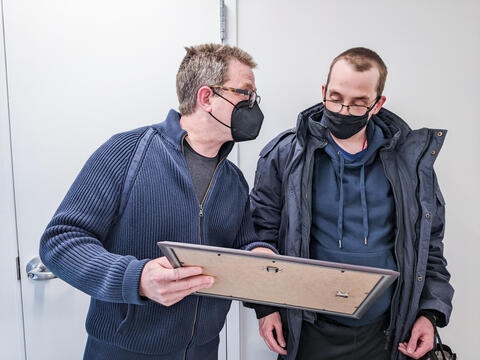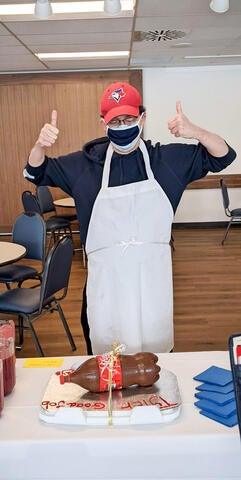 Tyler Allen works in the kitchen at Grebel, washing dishes and helping the cooks prepare and serve food. He always has a friendly word for staff and students, and is a reliable source for sports news—especially concerning the Toronto Maple Leafs.
Tyler Allen works in the kitchen at Grebel, washing dishes and helping the cooks prepare and serve food. He always has a friendly word for staff and students, and is a reliable source for sports news—especially concerning the Toronto Maple Leafs.
Marcus Shantz presented Tyler Allen with a congratulatory certificate.
Tyler also used to love sugary soft drinks—but he doesn’t drink them anymore. Almost three years ago, Tyler’s grandmother challenged him to stop drinking soft drinks for one hundred days—and she offered him a small reward if he did it. He succeeded at this challenge, and noticed that he felt healthier as a result. He didn’t miss soft drinks as much as he thought he would. So Tyler decided to go beyond his original goal, and see how long he could last without drinking a soft drink.
A few weeks ago, we celebrated Tyler’s “One Thousand Days Without Pop” at Grebel. We held a special coffee break, offered congratulatory speeches, and we presented Tyler with a special certificate. We were impressed by Tyler’s example of making a positive change in his lifestyle, because we all know that it requires character and discipline.
 Staff and Faculty had a “1000 Days Without Pop” celebration for Tyler Allen, complete with a cake in the shape of a pop bottle and pop-themed treats.
Staff and Faculty had a “1000 Days Without Pop” celebration for Tyler Allen, complete with a cake in the shape of a pop bottle and pop-themed treats.
He also reminded us that small changes to our habits can have a big impact over time. I did the math: the average can of pop contains 39 grams of sugar. Assuming Tyler used to drink one can per day, he avoided consuming 39 kilograms (86 pounds) of sugar during his thousand days without pop!
Grebel has something to learn from Tyler’s example. We’ve spent the past few months working on a new strategic plan to guide us into the next three years. We’ve made our plan in a highly uncertain environment, as we emerge from two years of pandemic into a troubled economy, and enter our fourth year of a government-mandated freeze on university revenues.
When organizations make strategic plans, they often feel pressured to announce a major goal—a new program, a building project, a radical new direction. But as James Clear, the author of Atomic Habits, points out, “Success is the product of daily habits—not once-in-a-lifetime transformations.” Clear argues that good habits—expressed in the daily life and culture of an organization—are more important for long-term success than goals. To paraphrase Aristotle, we become what we do habitually.
I hope you will take some time to read through our new strategic plan. You may notice that we do not announce a new building, or another entirely new program or project. We do reflect on our values, identity, and mission—on what Grebel can be at its best. Then we identify the organizational habits that will lead us towards our best. This is the work we need to do for Grebel to thrive in the future. Much of this work is not flashy or exciting, but we know it is important. As Tyler demonstrated, small, positive changes to our habits can yield impressive results in the long run.





